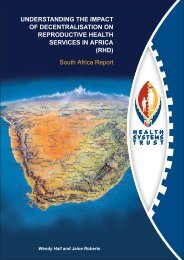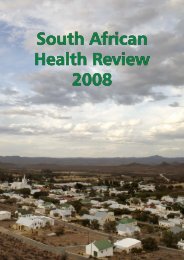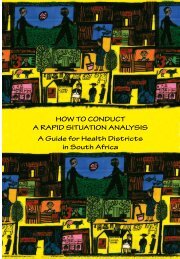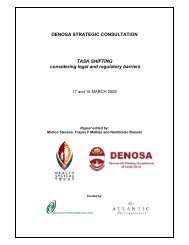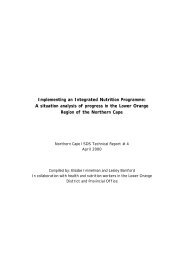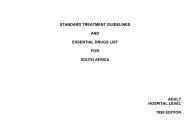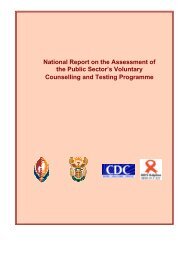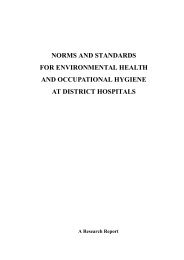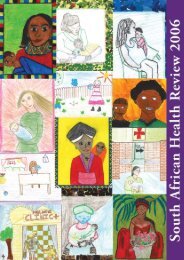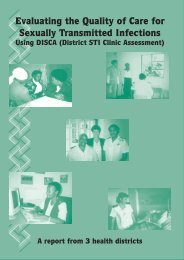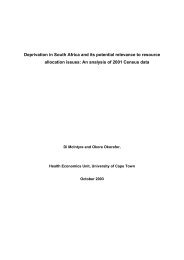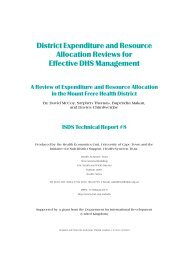SAHR 2007 - Health Systems Trust
SAHR 2007 - Health Systems Trust
SAHR 2007 - Health Systems Trust
You also want an ePaper? Increase the reach of your titles
YUMPU automatically turns print PDFs into web optimized ePapers that Google loves.
<strong>Health</strong> Policy and Legislation 2<br />
the national health system, which includes the private health<br />
sector, can be monitored and evaluated on a continuous<br />
basis.<br />
With the passage of the National <strong>Health</strong> Act the legislative<br />
phase of development was largely completed. Many of the<br />
Regulations contemplated in the Act have yet to be written.<br />
However, the majority of the policy principles contained in<br />
government’s early policy documentation have now been<br />
enacted and the next few years should be geared towards<br />
practical implementation and legislative consolidation as<br />
opposed to major legislative changes.<br />
The Medical Schemes Amendment Bill (Bill 80 of 2001) was<br />
published for public comment on 24 November 2006. The<br />
Bill makes provision for the establishment of a Risk Equalisation<br />
Fund (REF). The REF will be administered by the CMS.<br />
Medical schemes whose risk profile is below the norm will<br />
pay into the REF while those whose risk is higher than the<br />
norm will receive payments from the REF. The norm which will<br />
be determined on the basis of certain PMB conditions aims<br />
to equalise risks in terms of the membership profile to which<br />
schemes are exposed. Schemes with younger, healthier<br />
members will subsidise those with older, sicker members.<br />
Whilst the principle has been fairly well accepted within the<br />
industry there has been some criticism about the perceived<br />
impact that the REF will have on schemes which are efficient<br />
in managing the health of their members as opposed to<br />
those that are not. The REF and its likely impact, is addressed<br />
in greater detail in the chapter on Medical Schemes. The<br />
Medical Schemes Amendment Bill is likely to go through<br />
Parliament in late <strong>2007</strong> for implementation in 2008.<br />
The Bill almost casually makes provision for low income<br />
medical schemes (LIMS) in a few lines. 18 The Bill proposes<br />
an amendment to section 67 of the Medical Schemes Act in<br />
terms of which the Minister of <strong>Health</strong> can prescribe variations<br />
from the requirements of certain regulations to be applied<br />
to medical scheme products which cater specifically for ‘low<br />
income earners’ provided that such variations are reasonably<br />
necessary to create conditions for the emergence of<br />
such medical scheme products in the market and in the best<br />
interests of ‘low income consumers’. This phrase was not<br />
defined in the Bill as published for public comment.<br />
The National <strong>Health</strong> Act allows the Minister of <strong>Health</strong> to<br />
make Regulations as to the manner in which the Director-<br />
General may publish reference price lists for use by medical<br />
schemes and providers of health care services. The Regulations<br />
were published in final form on 23 July <strong>2007</strong>. 19 They<br />
allow the Director-General to call for a wide range of information<br />
from stakeholders and to hear representations on<br />
and to enter into correspondence with interested parties in<br />
order to evaluate the information submitted. The Regulations<br />
stipulate that where a consultant is commissioned to conduct<br />
a costing survey for the purpose of submitting information to<br />
the Director-General, the consultant must be free from any<br />
interest and any business relationship which could interfere<br />
with his ability to objectively evaluate the costs. The Regulations<br />
require the Director-General to take into account<br />
certain parameters when determining the reference price list<br />
and some of these include:<br />
➤ the advice of an advisory committee appointed by<br />
the Minister of <strong>Health</strong> in terms of section 91(1) of the<br />
National <strong>Health</strong> Act;<br />
➤ the need for private health establishments and health<br />
agencies to have a return on investment;<br />
➤ the need for certainty, sustainability, affordability and<br />
stability within the medical schemes environment and<br />
among private sector consumers; and<br />
➤ the need to eliminate perverse incentives, unethical<br />
business practices and unprofessional conduct from<br />
the health care industry.<br />
Despite this, the reference price list determined by the<br />
Director-General remains a reference price list for stakeholders<br />
to use or ignore as they see fit.<br />
The vast majority of Regulations under the National <strong>Health</strong><br />
Act have yet to be written despite the fact that this Act was<br />
first published in 2004. Section 47 of the Act allows the<br />
Minister of <strong>Health</strong> to make Regulations on quality requirements<br />
and standards relating to human resources, health<br />
technology, equipment, hygiene, premises, the delivery of<br />
health services, business practices, safety and the manner in<br />
which users are accommodated and treated. None of these<br />
Regulations has been published for comment.<br />
Section 39(1) of the National <strong>Health</strong> Act allows the Minister<br />
of <strong>Health</strong> to “make regulations relating to:<br />
(a) the requirements for the issuing or renewal of a certificate<br />
of need;<br />
(b) the requirements for a certificate of need for health<br />
establishments and health agencies existing at the<br />
time of commencement of this Act;<br />
(c) the requirements for a certificate of need for health<br />
establishments and health agencies coming into being<br />
after the commencement of the Act;<br />
25



